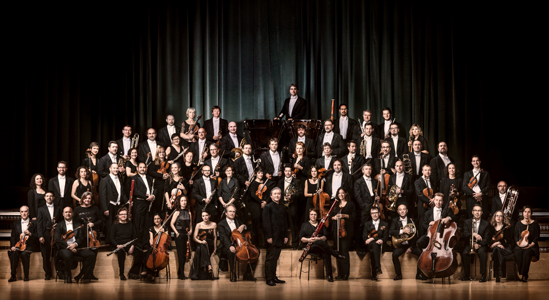At 8 pm on Friday, 27 September, the Barcelona Symphony Orchestra will open the 2019_20 season in L’Auditori’s Sala 1 Pau Casals with a programme consisting of “A German Requiem” by Johannes Brahms and the commissioned work “Human Brother” by the composer Ferran Cruixent.
The event, which will be directed by the OBC’s principal conductor, maestro Kazushi Ono, will also feature the Orfeó Català and solos sung by soprano Ilona Krzywicka and baritone Dietrich Henschel. The programme can be seen again on Saturday 28 at 7 pm and Sunday 29 at 11 am.
At 8 pm on Friday, 27 September, the Barcelona Symphony Orchestra will open the 2019_20 season in L’Auditori’s Sala 1 Pau Casals with a programme consisting of “A German Requiem” by Johannes Brahms and the commissioned work “Human Brother” by the composer Ferran Cruixent.
The event, which will be directed by the OBC’s principal conductor, maestro Kazushi Ono, will also feature the Orfeó Català and solos sung by soprano Ilona Krzywicka and baritone Dietrich Henschel. Additional performances will take place on Saturday 28 at 7 pm and Sunday 29 at 11 am.
The OBC with maestro Kazushi Ono, baritone Dietrich Henschel, soprano Ilona Krzywicka and the Orfeó Català.
Brahms’ Requiem and the new work by Ferran Cruixent
2018 marked the 150th anniversary of the première of “A German Requiem” by Johannes Brahms, one of the greatest masterworks within the symphonic choral repertoire of all time. The work eschews the traditional Mass for the Dead’s canonical structure and is rather a writing of great expressiveness that ponders the most human aspects of death.
As regards “Human Brother”, this is a work for soprano and orchestra that the OBC commissioned the composer Ferran Cruixent to write and which will receive its world première this weekend. It is a single-movement work based on Cruixent’s text “Prayer for the Human Brother” which explores the relationship between humans and artificial intelligence at the dawn of a New Generation.
The soprano soloist plays the role of a female artificial super-intelligence who comes from the future to pray for humanity, a manifestation through which to reflect upon the humanism we have lost and to question if AI is intelligence or merely an artifice.
Some orchestral motifs, melodies and texts were created using machine learning and later transcribed to the score. Liturgical references to Gregorian chant have also been processed using computational algorithms.
This was made possible through a collaboration with the Barcelona Supercomputing Center and Doctor of Physics Artur Garcia-Saez, who worked with the MareNostrum 4 supercomputer to make sounds using audio from symphonic works by Ferran Cruixent.
The musicians also have to use special techniques, such as Cyber Singing (that premièred for the first time in 2010 on Cruixent’s symphonic work “Cyborg”). Cyber Singing is a digital voice produced by the musicians themselves and introduces the possibility of a new kind of interaction between the composer and the performer, establishing a communication that goes beyond the score.
The MP3 file prepared by the composer is played by the musician on their own mobile phone, a device normally used for other purposes.
The work’s epilogue references the Seikilos epitaph, considered the oldest surviving, complete musical composition that contains musical notation and dates from around 200 BCE. The tombstone bears the following inscription: “I am a tombstone, an image. Seikilos placed me here as an enduring sign of remembrance beyond death.”
L’OBC inaugura temporada amb Un rèquiem alemany de Brahms i l’estrena absoluta de Human Brother de Cruixent
26-Sep-2019 – Aleix Palau

